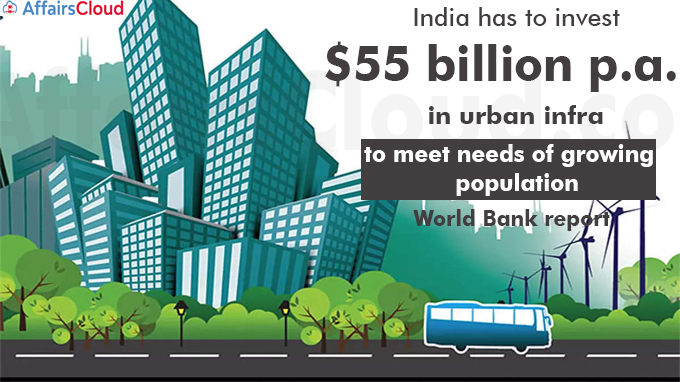 On November 14, 2022, the World Bank (WB) released a report titled ‘Financing India’s Urban Infrastructure Needs: Constraints to Commercial Financing and Prospects for Policy Action’.
On November 14, 2022, the World Bank (WB) released a report titled ‘Financing India’s Urban Infrastructure Needs: Constraints to Commercial Financing and Prospects for Policy Action’.
- As per it, India needs to invest USD 840 billion over the next 15 years till 2036 (in 2020 prices) or an average of USD 55 billion (Rs 4.46 lakh crore) per annum into urban infrastructure to meet the needs of fast-growing urban population.
- This USD 840 billion in the next 15 years is equivalent to 1.18% of estimated Gross Domestic Product (GDP) over this period.
- The report also highlighted the need for more private and commercial investments to meet emerging financial gaps.
Who prepared the report?
This report was prepared by a WB team comprising Sohaib Athar (Senior Urban Specialist), Roland White (Global Lead for City Management, Governance and Finance), and Harsh Goyal (Urban Specialist) under the leadership and overall guidance of Junaid Kamal Ahmad, WB Group’s India Country Director.
Reason behind More Investments & PPP:
By 2036, 600 million people 40% of the population will live in urban cities in India. With the growing urban population there will be more demand for clean drinking water, reliable power supply, efficient and safe road transport amongst others. So, more funds are required for urban infrastructure.
Requirement of PPP Financing:
Currently, the central and state governments finance over 75% of city infrastructure, while Urban Local Bodies (ULB) finance 15% through their own surplus revenues, and only 5% are currently being financed through private sources.
- This implies that the government’s current (2018) annual urban infrastructure investments topping at USD 16 billion(Rs 1.3 lakh crore), and much of the gap will require private financing.
- Notably, there is decline in Public Private Partnership (PPP) over the last decade both in monetary value and transaction volume. 124 PPP projects have been awarded in the urban sector since the year 2000 worth a total cost of USD 5.5 billion.
- Also, there is slow implementation of Central Government’s flagship Urban Missions such as Smart Cities Mission (SCM) and the Pradhan Mantri Awas Yojana (PMAY).
So, in order to overcome this gap, private financing is required.
Other Highlights:
i.The report recommends expanding the capacities of ULBs to deliver infrastructure projects at scale.
- Currently, the 10 largest ULBs were able to spend only two-thirds of their total capital budget over three recent fiscal years due to weak regulatory environment and weak revenue collection.
ii.Between 2011 and 2018, urban property tax stood at 0.15% of GDP compared to an average of 0.3-0.6% of GDP for low- and middle-income countries.
iii.ULBs have so far executed only about one-fifth of the cumulative cost under SCM and AMRUT over the last six financial years.
- The total cost of projects approved under these missions is USD 27 billion and USD 10 billion for SCM and AMRUT respectively which ULBs have been able to execute only to the extent of 22% (SCM) and 18% (AMRUT), respectively.
iv.Over the medium term, the report suggests a series of structural reforms including taxation policy and fiscal transfer system.
v.In the short term, it suggests to identify a set of large high-potential cities that have the ability to raise higher volumes of private financing.
Click Here for Official Report
Recent Related News:
i.WB has extended an unconditional loan of USD 250 million for Supporting Andhra’s
Learning Transformation (SALT) project for its reforms implemented by the Andhra Pradesh government.
ii.WB has appointed a chairman of the Court of Arbitration (CoA) and a neutral expert as
mandated in 2 separate processes requested by India and Pakistan in relation to the Kishenganga and Ratle hydroelectric power plants. Sean Murphy has been appointed as Chairman of the CoA and Michel Lino as the Neutral Expert.
About World Bank (WB):
President– David Robert Malpass
Headquarters– Washington D.C, United States (US)
Establishment– 1944




